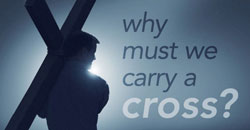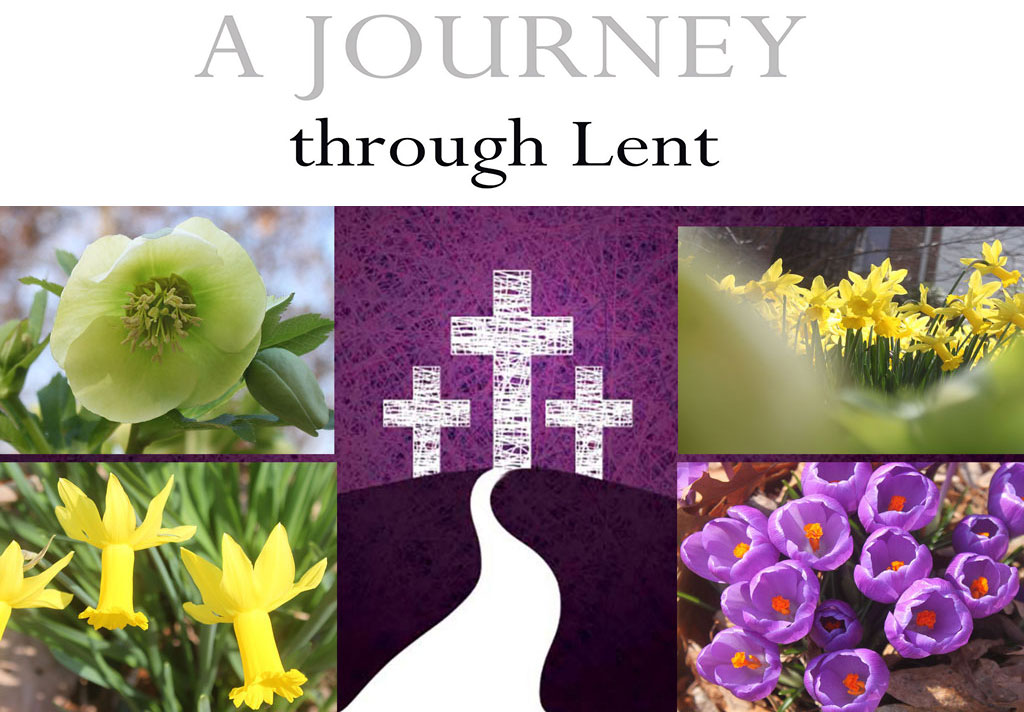Click here to view in a new window.
2024 Sun Feb 25
Voices this week on the Lectionary and Lent
1. Lawrence – from "Disclosing New Worlds" – "A New Call"

Now Jesus is changing direction and focus. He is beginning a new journey whose destination is Jerusalem. The journey towards Jerusalem is the narrative symbol for the new emphasis – the Way of the Cross.
This narrative journey will disclose increasingly who Jesus is (the one who must suffer) and intensifying conflict and direct confrontation with the powers ranged against him. Yet the focus is on the disciples. How will they react to “The Way”? Will they understand? Will they “see” and “hear” what Jesus is telling them? Most importantly, will they follow, or will the Way of the Cross prove (literally) a step too far?
There is a clear narrative pattern to “the way”. It occurs again in 9:31 and 10: 32-34, and in each case – as here – the pattern is repeated: Jesus tells the disciples that “the way” is the way of suffering and death; the disciples resist this; Jesus then teaches them further about discipleship and what it means to follow him.
That is why the change of direction results immediately in Jesus’ question: “Who do you say that I am?” This is not only the midpoint of the story, but also the narrative fulcrum around which the whole gospel pivots. Who do you believe Jesus is? Which Jesus will you follow – the Jesus who travels the Way of the Cross, or the glorious, triumphant Jesus whom the disciples desperately want him to be? Or will it be a Jesus of your own making?
Jesus goes on to spell out what the Way of the Cross means for any would-be followers. It requires three things: denying self, taking up the cross, and following. There is no other way. If the Lenten journey means anything, it means discovering what this entails – just as it did for the disciples. It is not about giving up something that we like, or coping with a difficult situation at work, home or at church. That is to spiritualise and trivialise Jesus’s address and Kings’ call. The gospel was written for a community that understood at first hand what persecution meant. It meant being hauled up before the courts and, like Peter, being asked, under threat of death, “Aren’t you one of his disciples?” The temptation is to deny Jesus in order to save our own lives. Jesus tells the disciples, “If you confess me, you deny yourself – because you will be put to death for it! And yet that is actually the way to find (save) your life!”
To “take up the cross” means literally that! The journey Jesus has just begun is the journey of political confrontation. Ched Meyers suggests that the phrase “Take up your cross!” was in all likelihood a recruitment slogan for revolutionary groups – effectively “suicide squads” who were being asked to risk almost certain capture and crucifixion. There is nothing spiritualised or trivialised about Jesus’ call to discipleship here. The message of the Kingdom that he proclaims is necessarily the Way of the Cross because it is the promise and announcement and enactment of a new world order – God’s.
Note that this is a new call. In 1:16ff Jesus calls the first disciples, saying simply, “Follow me, and I will make you fish for people”. In other words, there are people who want to hear Jesus’ message, and he invites them to follow and be part of spreading Good News that is eagerly received. Now the direction changes. This is a new journey – a journey of confrontation. It bears a deadly cost. And as Jesus enters this new phase of his ministry, he does not say, “Follow me”, but warns the disciples about what is entailed and gives them the opportunity to back out. Lent is about facing the seriousness of discipleship, and wrestling seriously with the question about whether or not we are “up for it”
Bingo Night, Feb 26, 6pm-7:30pm, Port Royal Fire house

Mon., Feb. 26th, Bingo Night 6-7:30PM at Port Royal Fire Department St Peter’s is serving as a Partner in Education with the Caroline County Public Schools.
We will be providing snacks for the Caroline County. If you would like to help, please bring granola bars, individually wrapped bags of trail mix, or small bottles of water and place them in the back pew by Sunday, Feb. 25.
St. Matthias, Feb. 24
After the Ascension of Jesus, the Apostle Peter, in a “general assembly of the faithful” declared the need for a 12th apostle, since Judas was no longer one of the twelve. With all the questions, doubts, and dangers facing the apostles, they chose to focus their attention on finding a twelfth apostle. Twelve was a very important number to the Chosen People: twelve was the number of the twelve tribes of Israel. If the new Israel was to come from the disciples of Jesus, a twelfth apostle was needed.
One hundred and twenty people were gathered for prayer and reflection in the upper room, when Peter stood up to propose the way to make the choice.
Peter had one criterion that, like Andrew, James, John, and himself, the new apostle be someone who had been a disciple from the very beginning, from his baptism by John until the Ascension. The reason for this was simple, the new apostle must become a witness to Jesus’ resurrection. He must have followed Jesus before anyone knew him, stayed with him when he made enemies, and believed in him when he spoke of the cross and of eating his body — teachings that had made others melt away.
Two were considered as most worthy of the dignity–Joseph, called Barsabas, and, on account of his extraordinary piety, surnamed the Just, and Matthias. Matthias was chosen by lot. Clement of Alexandria says that Matthias, like all the other apostles, was not chosen by Jesus for what he already was, but for what Jesus foresaw he would become. He was elected not because he was worthy but because he would become worthy
Matthias was one of the disciples about which little was written. However, the Book of Acts records that he had been a consistent follower from Jesus’ baptism until the Ascension. We do know that he was present at the Pentecost.
Sunday’s Thoughts Lent 2, Feb. 25

Perceptions can change in scripture and your mission can change too.
On Jan 18, the date of Peter’s confession Mark 8:27-30 Jesus went to the predominately pagan region of Caesarea Philippi to question and deepen his disciples’ understanding of his role and theirs. “Who do you say that I am?” Peter got it right- Jesus is the Messiah.
On Last Epiphany on the Transfiguration (Feb. 11) Mark 9:2-9, Peter now misread the situation wanted to build three tents, preserving the event much longer.
Now this Sunday on Lent 2 (Feb. 25) with an earlier sripture Mark 8:31-38 Peter who had correctly identified Christ as the Messiah now gets Christ’s mission wrong. Peter saw Jesus as his Messiah who was to save Israel from the Romans. Peter’s view of the Messiah was not one who went to the cross, rejected, and died. He was just told he was wrong but rebuked, set in his place.
This is a different response from when Jesus called the first disciples. Jesus calls the first disciples, saying simply, “Follow me, and I will make you fish for people”. In other words, there are people who want to hear Jesus’ message, and he invites them to follow and be part of spreading Good News that is eagerly received. They are part of the advertisment.
They have seen the results in healing the sick of all ills into many remote communities. He has fed the many and he has drawn huge crowds. And don’t forget his proclamation of a new Kingdom, not that of the Romans.
Now, Jesus is seemingly making an about face. Peter is questioning that saying – What is this Kingdom when the leader is tp be killed ?
Deny self, take up the cross and follow ? Now it seems to be a mission of confrontation that not everyone is up to. Peter is thinking “Did I sign up for this?”
Our confrontation is take Jesus message into the world where there is suffering is broad. We may not be setting up to be killed but there is death to many of our solitary desires to witness a larger pictures. As Debi Thomas writes “To take up a cross as Jesus did is to stand in the center of the world’s pain.”
“Taking up the cross means recognizing Christ crucified in every suffering soul and body that surrounds us, and pouring our energies and our lives into alleviating that pain — no matter what it costs.”
Our challenge for our ministries is to seek areas where is pain, trouble or other dislocation and see what we can do to ameliorate that. How can life be made better?
For instance, Sacred Ground will look at the food issue involving children. Food insecurity is higher among children than the population as a whole. While Caroline County provides free breakfast and lunches, there is the need for snacks for tutoring activities outside of the normal school day. What about meals at home on the weekends and during the summer ?
There other possible avenues involving mentoring and adopting a classroom that need to be discussed.

